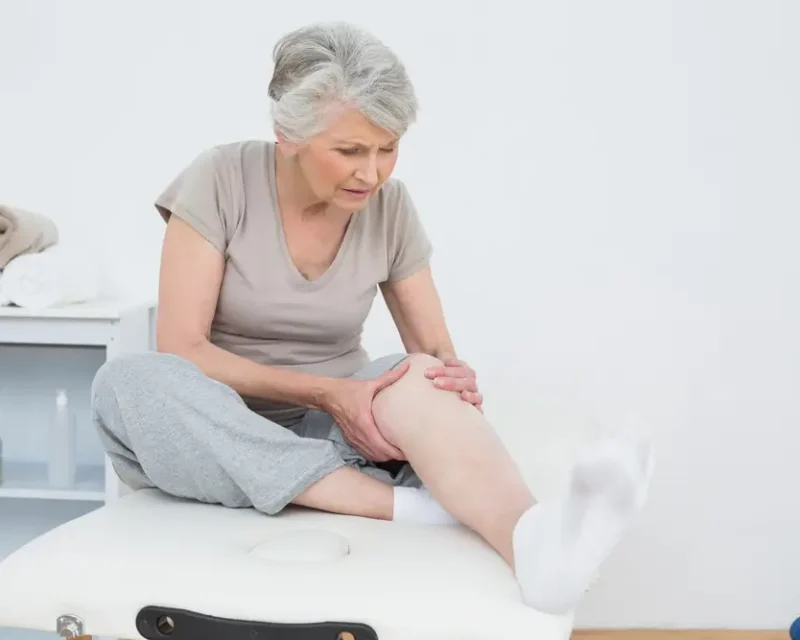Conditions
Are you struggling with knee pain and looking for ways to find relief? Knee pain can be incredibly debilitating and affect your daily activities.
Knee pain isn’t just a physical ailment; it’s a thief of joy, robbing you of the ability to engage in the activities you love fully. Whether playing with your children, participating in sports, or simply taking a stroll, knee discomfort can weigh heavy on your shoulders, casting a shadow over life’s simplest pleasures.

Injury from accidents, sports, or repetitive motions is a major cause of knee pain. Whether it’s a sprain, strain, or tear in the ligaments, tendons, or meniscus, such injuries can cause significant discomfort.
Arthritis, common among older adults, causes knee pain due to inflammation and stiffness. Managing symptoms is crucial for mobility and pain relief.
Overuse, like running or standing for long periods, can cause knee pain. Rest, stretching, and strengthening exercises can prevent overuse injuries and ease discomfort.
Knee pain is a common complaint that can affect people of all ages, and its signs and symptoms can vary depending on the underlying cause. Recognizing these can help in seeking timely medical advice and treatment.
The most obvious symptom of knee issues is pain, which can range from a mild ache to severe, sharp pain. The location and nature of the pain can vary, affecting any part of the knee.
Swelling in the knee is a frequent symptom and can occur due to inflammation or fluid build-up. This can make the knee feel stiff and bulky.
Along with swelling, the knee might feel warm to the touch and appear redder than the surrounding areas, indicating inflammation.
A common symptom, especially when getting up after sitting for a long time or when waking up in the morning. Stiffness can limit the range of motion in the knee.
Our professional team of providers and staff will provide you with the care that’s right for you.

Chiropractic care offers a comprehensive approach to knee pain, utilizing targeted adjustments to enhance joint alignment and function. These techniques help alleviate pain and improve mobility by correcting joint restrictions and misalignments. Complementary therapies like ultrasound or laser treatment may also be employed to reduce inflammation and promote healing.
In addition to direct treatment, chiropractors focus on strengthening the muscles around the knee to boost stability and prevent future issues. They also evaluate and adjust biomechanical imbalances in the hips and spine that contribute to knee pain. This holistic strategy not only eases discomfort but also addresses underlying causes to promote long-term knee health and function.
Chiropractic care alleviates knee pain primarily through adjustments that correct misalignments in the spine and joints, which can impact knee function and pain. Techniques such as joint manipulation, mobilization, and soft tissue therapy are employed to improve alignment, reduce joint stress, enhance mobility, and decrease inflammation around the knee.
Chiropractors treat a variety of knee conditions including osteoarthritis, patellar tendinitis, bursitis, and injuries related to overuse or sports, such as runner’s knee. They focus on the biomechanical dysfunctions that contribute to these conditions and use specific techniques tailored to each condition to promote healing and reduce pain.
In many cases, chiropractic care can help manage knee pain effectively enough to delay or even prevent the need for surgery by improving joint function, reducing inflammation, and strengthening the muscles around the knee. However, the feasibility of avoiding surgery depends on the specific condition and severity of the knee issue.
During your first session, the chiropractor will conduct a thorough examination, including a review of your medical history, a physical examination of your knee, and possibly diagnostic tests to assess the condition of your knee and surrounding structures. The chiropractor will then discuss a personalized treatment plan, which may include adjustments, exercises, and other therapeutic techniques.
Chiropractors often use complementary therapies such as therapeutic exercises, ultrasound therapy, laser therapy, and advice on diet and lifestyle changes to enhance the effectiveness of their treatments for knee pain. These therapies help to strengthen the knee, improve mobility, and ensure long-term relief from pain.
Our professional team of providers and staff will provide you with the care that’s right for you.
N8 Family Chiropractic provides quality chiropractic and wellness services at each of our locations. Whether you are young or young at heart, we believe chiropractic care can help you.

The contents of this website including text, graphics, images, and other materials are provided for informational purposes only and is not intended to be a substitute for professional health advice, diagnosis, or treatment.